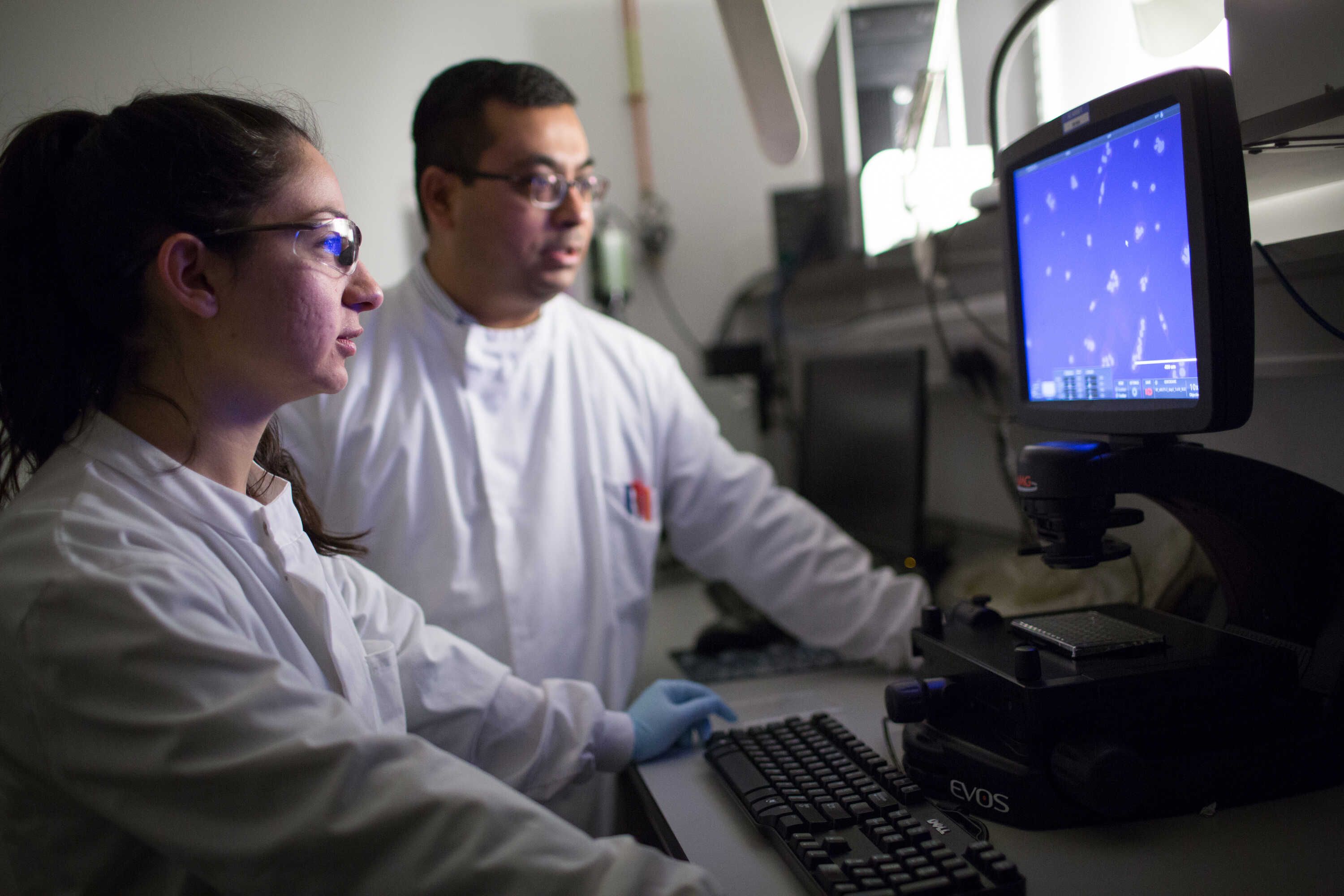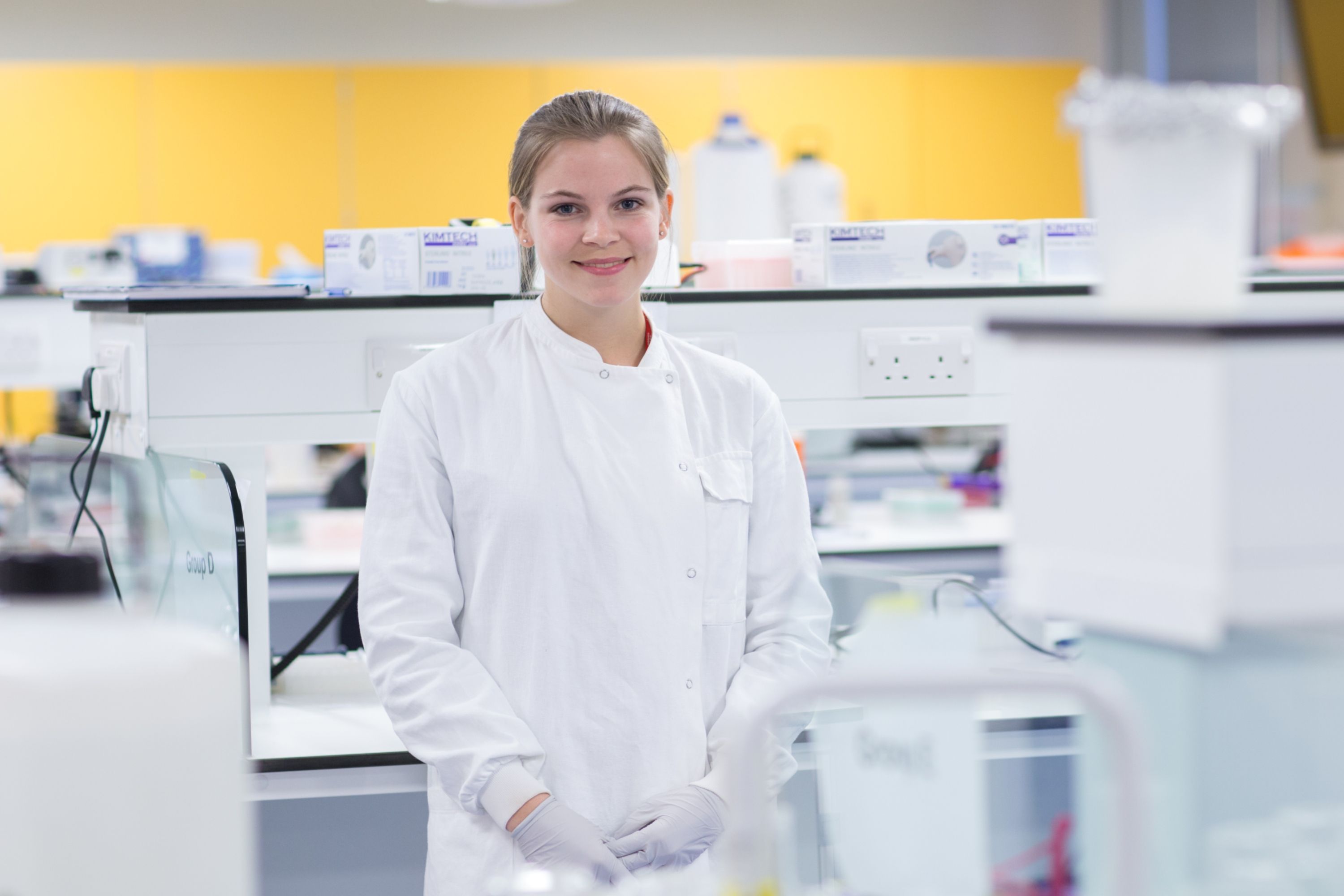
Biomedical Research (Data Science)
Interdisciplinary training in 'big data' analysis, building skills towards a career in biomedical research.
Receive interdisciplinary training in 'big data' analysis and build skills towards a career in biomedical research
Learn how to implement statistical and machine learning techniques and interpret data sets
Develop your communication, presentation and grant-writing skills across two research projects
Course key facts
-
Qualification
-
MRes
-
-
Duration
1 year
-
Start date
September 2025
-
Study mode
Full-time
-
Fees
£20,600 Home
£45,000 Overseas
-
Delivered by
-
Location
-
Hammersmith
-
Course overview
Receive interdisciplinary training in 'big data' analysis in relation to biomolecular studies on this Master's course.
On this stream of the MRes in Biomedical Research, you'll receive core training in multivariate statistics, chemometrics and machine learning methods.
The course will build your research experience in the development and application of these methods to real-world biomedical studies.
You'll also learn to handle large-scale data from molecular phenotyping techniques such as metabolic profiling and related genomics approaches.
Two research projects are major components of this course.
These will help you develop communication, presentation and grant-writing skills, and become familiar with evaluating research reports.
Choose your stream
You have the option of choosing our general biomedical research stream, or one of eight specialisms. All of our biomedical research streams have the same course structure and each stream has its own tailored set of projects alongside a core programme of lectures, seminars and practical classes.
You should consider which stream is right for you according to your career aims and background. If an offer of admission is made, it will correspond to a specific stream. Switching streams is not possible once you have commenced your studies.
- General Biomedical Research
- Anaesthetics, Pain Medicine and Intensive Care
- Bacterial Pathogenesis and Infection
- Data Science (this stream)
- Epidemiology, Evolution and Control of Infectious Diseases
- Microbiome in Health and Disease
- Molecular Basis of Human Disease
- Respiratory and Cardiovascular Science
Is this stream for you?
This stream is suitable for students with a background in physical sciences, engineering, mathematics, computer science or similar field who wish to apply their numeric & computational skills to solve problems with biomedical data.
You will gain experience in analysing and modelling big data from technologically advanced techniques applied to biomedical questions.
You will perform novel computational informatics research and exercise critical scientific thought in the interpretation of results, implement and apply sophisticated statistical and machine learning techniques in the interrogation of large and complex biomedical data sets.
This stream is delivered by the Department of Metabolism, Digestion and Reproduction.
Structure
This page is updated regularly to reflect the latest version of the curriculum. However, this information is subject to change.
Find out more about potential course changes.
Please note: it may not always be possible to take specific combinations of modules due to timetabling conflicts. For confirmation, please check with the relevant department.
You’ll take all of these core modules.
Core modules
Compose a grant proposal, appropriate for submission to an academic funding body.
This will correspond to your research project(s).
You'll carry out two mini research projects, exploring some of the most technologically advanced approaches currently being applied to biomedical research.
You have a wide range of research projects available to you.
The projects available to you are determined by your chosen stream.
You can also choose projects from other streams, though you will only have priority within your own stream.
Example projects
- Physics-Informed Neural Networks to Predict Blood Glucose Levels in Patients with Type-I Diabetes
- Explainable prognostic models for progressive pulmonary fibrosis
- Border Rendering Feature Orthogonal Network for Blood Vessel Segmentation
- Revealing the hidden fingerprints of drug exposure and metabolism in population-scale metabolomics data by statistical correlation and database development.
- Integrative analysis of single-cell RNA-Seq data to explore the association of mosaic loss of chromosome Y with idiopathic pulmonary fibrosis
- Exploring Expression Patterns and Shared Genetic Mechanisms in MS through Integrative Genetic Analysis
- Unpaired Style Mapping using Generative Models Techniques for Medical Image Segmentation
- Characteristics of Urinary Pathogens in People Living with Dementia
- Integrating transcriptomic, epigenomic, and transcription factor binding data to unravel the function of TSPO in microglia.
- Machine Learning Applications to Radiomics of Early Pregnancy Ultrasound To Predict Miscarriage
See a full list of example Biomedical research projects on the Department of Metabolism, Digestion and Reproduction web pages.
Teaching and assessment
Teaching and learning methods
-
Demonstrations and seminars
-
Workshops
-
Computing labs
-
Journal clubs
-
Virtual learning environment
-
Tutorials
-
Lab-based learning
-
Facility Tours
-
Lectures
-
Debates
Balance of assessment
Key
- Grant writing exercise
- Research projects
- 10% Grant writing exercise
- 90% Research projects
Assessment methods
-
Laboratory-based research
-
Computer-based research
-
Oral presentation
-
Poster presentation
-
Research reports
-
Oral assessment
Entry requirements
We consider all applicants on an individual basis, welcoming students from all over the world.
How to apply
Apply online
You can submit one application form per year of entry. You can choose up to two courses.
In your personal statement and CV, please emphasise why you are interested in biomedical aspects of data science.
We also recommend highlighting your experience with coding, machine learning and statistics.
In our application system My Imperial, you will need to choose Biomedical Research (MRes 1YFT) in the Programme selection search. After this, you will be asked to choose the stream you wish to be considered for.
The Department's Biomedical Research Admissions FAQ provides more details about applying for the course.
There is no application fee for MRes courses, Postgraduate Certificates, Postgraduate Diplomas, or courses such as PhDs and EngDs.
If you are applying for a taught Master’s course, you will need to pay an application fee before submitting your application.
The fee applies per application and not per course.
- £80 for all taught Master's applications, excluding those to the Imperial College Business School.
- £100 for all MSc applications to the Imperial College Business School.
- £150 for all MBA applications to the Imperial College Business School.
If you are facing financial hardship and are unable to pay the application fee, we encourage you to apply for our application fee waiver.
Find out more about how to apply for a Master's course, including references and personal statements.
An ATAS certificate is not required for students applying for this course.
Tuition fees
Home fee
2025 entry
£20,600
You should expect and budget for your fees to increase each year.
Your fee is based on the year you enter the university, not your year of study. This means that if you repeat a year or resume your studies after an interruption, your fees will only increase by the amount linked to inflation.
Find out more about our tuition fees payment terms, including how inflationary increases are applied to your tuition fees in subsequent years of study.
Whether you pay the Home or Overseas fee depends on your fee status. This is assessed based on UK Government legislation and includes things like where you live and your nationality or residency status. Find out how we assess your fee status.
If you're a UK national, or EU national with settled or pre-settled status under the EU Settlement Scheme, you may be able to apply for a Postgraduate Master’s Loan from the UK government, if you meet certain criteria.
For courses starting on or after 1 August 2024, the maximum amount is £12,471.
The loan is not means-tested and you can choose whether to put it towards your tuition fees or living costs.
We offer a range of scholarships for students to support you through your studies.
See what opportunities you may be eligible for on our dedicated Scholarships search tool.
Overseas fee
2025 entry
£45,000
You should expect and budget for your fees to increase each year.
Your fee is based on the year you enter the university, not your year of study. This means that if you repeat a year or resume your studies after an interruption, your fees will only increase by the amount linked to inflation.
Find out more about our tuition fees payment terms, including how inflationary increases are applied to your tuition fees in subsequent years of study.
Whether you pay the Home or Overseas fee depends on your fee status. This is assessed based on UK Government legislation and includes things like where you live and your nationality or residency status. Find out how we assess your fee status.
If you're a UK national, or EU national with settled or pre-settled status under the EU Settlement Scheme, you may be able to apply for a Postgraduate Master’s Loan from the UK government, if you meet certain criteria.
For courses starting on or after 1 August 2024, the maximum amount is £12,471.
The loan is not means-tested and you can choose whether to put it towards your tuition fees or living costs.
Scholarships
The Dean’s Master’s Scholarships
Value per award
- £10,000
Who it's for
- All students applying to study a Faculty of Medicine Master’s course
The Dr Jean Alero Thomas Scholarships
Value per award
- Partial or full tuition fee at the Home rate
Who it's for
- All students applying to study a Faculty of Medicine lab-based Master’s course
Department of Metabolism, Digestion and Reproduction Bursaries
Value per award
- £2,000 (full-time) or £1,000 per year (part-time, two-years)
Who it's for
- Offer holders for the department's MSc/MRes courses
How will studying at Imperial help my career?
Strengthen your career prospects as aspiring Anaesthetists and Intensive Care physicians.
Cultivate a robust network within an inclusive Division, fostering valuable connections with academics and clinicians.
Participate in Departmental Research symposia, offering exposure, critical appraisal skills, expert engagement, and staying updated in the field.
Develop key academic skills to support your progress to PhD or medical school.
Develop essential soft skills, such as communication, teamwork, and adaptability, crucial for success in professional healthcare environments.
Get support with grant applications and publication of research findings, enriching academic and professional portfolios.
Participate in Departmental Research symposia, offering exposure, critical appraisal skills, expert engagement, and staying updated in the field.
Further links
Contact the department
Course Director: Professor Tim Ebbels
Course Deputy Director: Dr Elizabeth Want
Stream Organisers: Professor Tim Ebbels and Dr Joram Posma
Visit the Department of Metabolism, Digestion and Reproduction website.

Our students
Meet Biomedical Research students and see what they have to say about their studies.
You can also read more about our student achievements, including funding, publications and academic prizes.

Register your interest
Stay up to date on news, events, scholarship opportunities and information related to this course.

Events, tasters and talks
Meet us and find out more about studying at Imperial.

Terms and conditions
There are some important pieces of information you should be aware of when applying to Imperial. These include key information about your tuition fees, funding, visas, accommodation and more.
You can find further information about your course, including degree classifications, regulations, progression and awards in the programme specification for your course.
Programme specifications